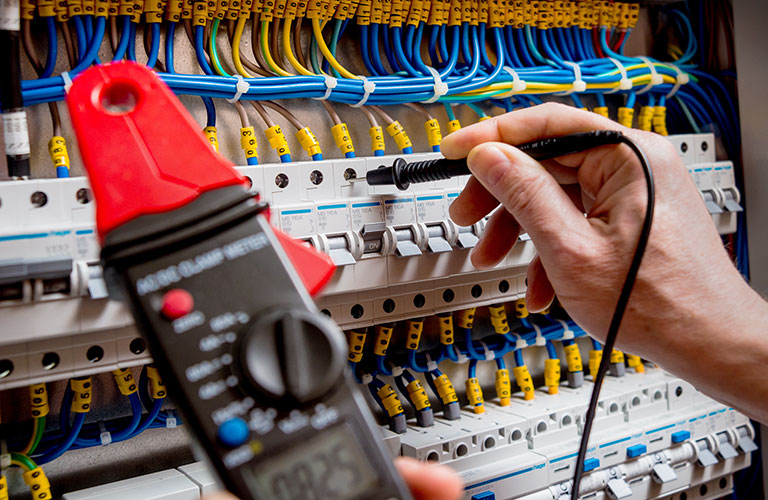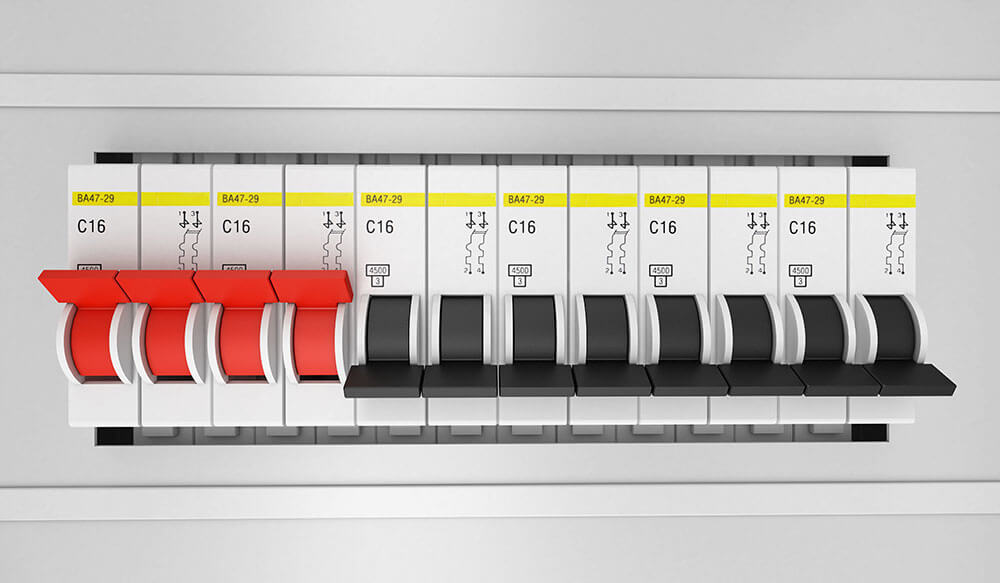Circuit Breakers Keep Tripping in My House
A circuit breaker “trips” (shuts off the electrical flow) in order to protect the circuit from overheating. It’s a safeguard that helps prevent damage and electrical fires. If it happens often, there’s a root cause that you need to address.
The three most common causes of a tripped circuit breaker are:
- Overloaded Circuit
- Short Circuit
- Ground Fault
Overloaded Circuit
This is the most common cause of a tripped breaker. It usually happens when you’re running too many power-consuming devices on the same circuit at the same time. The demand, or load, on the circuit is too high, and presto! The breaker trips to prevent overheating.

With a little detective work, you can often find the device that’s causing the issue. Before you flip the circuit back on, take note of what was running when the breaker tripped.
- Can you isolate the appliance that you turned on just before the breaker tripped?
- Have you recently added a new appliance or device to the circuit?
- Did you start using a space heater or other seasonal device that you haven’t used in awhile? Keep in mind that it doesn’t have to be a large device. Flipping on your hair dryer while the circuit is close to its max load can be enough to trip the breaker.
Have you noticed that any of your appliances have been running hot, making any strange new noises, having trouble starting, or not working as efficiently? A failing or faulty appliance will draw in more amps than usual, which can cause the circuit to overload.
If your appliances are good, there are two solutions for an overloaded circuit:
- Move power-heavy devices from the overloaded circuit to a different general purpose circuit
- Turn off some of the devices on the circuit to reduce the load
If this doesn’t resolve the issue, you may need to have an electrician install a new dedicated circuit and outlet to handle your home’s amp load.
Short Circuit
A more dangerous potential cause of a tripped breaker is a short circuit. A short circuit is caused when a “hot” or active wire touches either another hot wire or a “neutral” wire in one of your outlets. This results in a large current flow, creating more heat than the circuit can handle.
A short circuit should cause a breaker to trip or a fuse to blow. It may also cause sparks, popping sounds or even smoke. You may observe blackening around the outlet or notice a burnt smell. If this happens, leave the circuit breaker tripped and call an electrician immediately.
What causes a short circuit? There are many potential culprits, including a loose connection, improper wiring, or damaged wires. A faulty switch, plug, cord, appliance or lighting fixture may be to blame. Some are simple fixes, others more complex. Short circuits are a fire hazard, so don’t wait to address the problem—call an electrician.
Ground Fault
Safety is paramount in dealing with any electrical issue, whether big or small. Do NOT attempt to inspect or repair any electrical issue unless you’re sure it’s safe and you’re certain of the process. When in the slightest doubt, call an electrician. Unless you’re dealing with a simple overloaded circuit, you will usually need a professional’s help to safely resolve circuit breaker problems.
A ground fault is similar to a short circuit. It occurs when a hot wire touches the grounding wire. Like a short circuit, you may notice discoloration or a burning smell around your outlets.
Ground faults are usually the result of damaged or faulty equipment. They are also dangerous, as they render the safe “grounding” of your outlet useless. If you suspect a ground fault, call an electrician ASAP!
Safety First
In the Wichita area, Reddi’s electricians are on call to help when your circuit breakers keep tripping. Give us a call:
Resources found on our website are provided as general guidelines, and Reddi Industries does not assume any liability resulting from the provided information.

